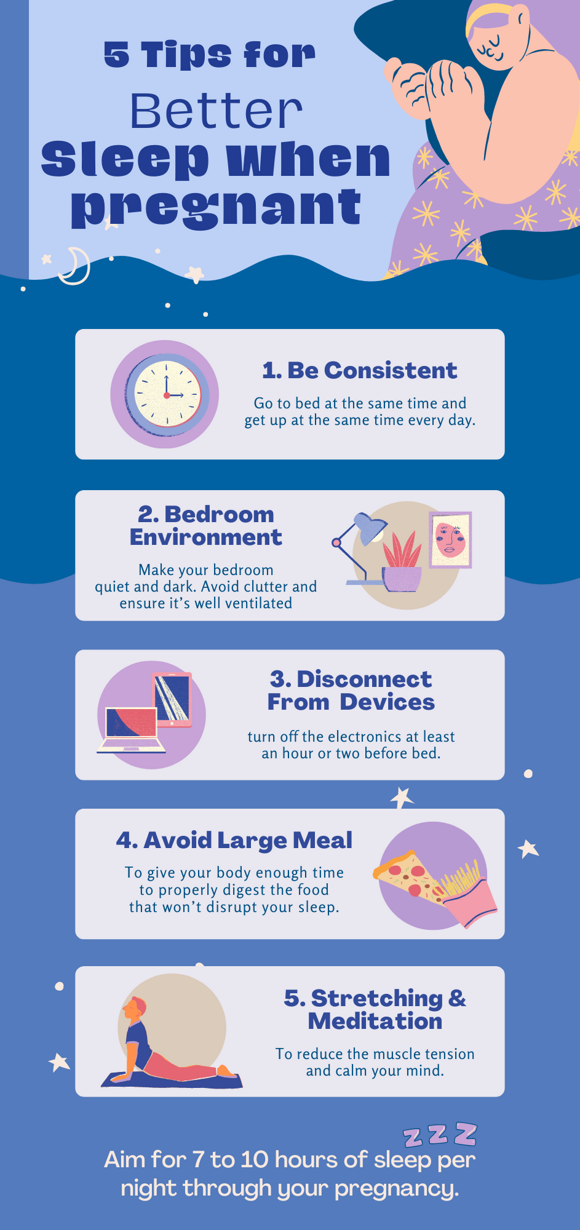
As the body undergoes hormonal changes and physical discomfort during pregnancy, sleep patterns and quality can be disrupted, requiring expectant mothers to adapt and find new ways to ensure restful sleep during this transformative time.
Common challenges faced with sleeping while pregnant
Pregnancy and sleep are often two words that struggle to come together harmoniously for most. Pregnancy can have a significant impact on sleep, presenting expectant mothers with various challenges.
- Temperature changes, such as hot flashes and increased body heat, can disrupt sleep and make it difficult to find a comfortable sleeping position.
- Pregnancy can bring about leg cramps, which often occur during the night and can cause discomfort and awakenings.
- Nasal congestion and increased blood volume can lead to snoring and difficulty breathing, further affecting sleep quality.
- Morning sickness doesn’t just occur in the morning, it can hit at any time during the day, and unfortunately at night as well. Although for most mums, they feel better lying down if they feel nauseous.
- Toilet visits during the night are not uncommon during pregnancy, and unfortunately can disrupt even the deepest sleep. You may find it gets worse toward the end of your pregnancy when there is quite a bit of pressure on your bladder from your growing baby.
- Strange pregnancy dreams can be quite normal. There’s a lot of new thoughts running through your head when anticipating the arrival of a new baby, throw in hormonal changes and you just never know what comes out in your dreams. Keep a dream journal if you wish to explore those feelings, otherwise focus on the positive thoughts before bedtime to promote restful sleep.
These challenges, among others, highlight the importance of finding strategies to promote better sleep during pregnancy, such as using pillows for support, practicing relaxation techniques, and maintaining a cool and well-ventilated sleep environment.
Importance of sleep during pregnancy
The amount of sleep needed during pregnancy can vary throughout the three trimesters, and between women. In the first trimester, fatigue is common, and women may require more sleep than usual, often around 7-10 hours per night. During the second trimester, energy levels may improve, and you may find yourself returning to your previous sleep hours, about 7-8 hours per night. In the third trimester, discomfort and frequent bathroom trips can disrupt sleep, so aiming for 7-10 hours of sleep and incorporating naps during the day, and weekends can help maintain adequate rest. It's important for pregnant women to listen to their bodies and prioritise sufficient sleep for their overall well-being.
Tips for getting a better sleep during pregnancy
Getting optimal sleep and creating a comfortable sleep environment will be key:
- Prioritise restful sleep: Getting optimal sleep is crucial for overall health and well-being as it supports physical and mental rejuvenation. Make sleep a priority and allocate enough time for quality rest.
- Establish a sleep routine: Create a consistent sleep routine by going to bed and waking up at the same time each day. This helps regulate your body's internal clock and promotes better sleep quality. Avoid stimulating activities and electronic devices before bed to prepare your mind and body for sleep.
- Create a comfortable sleep environment: Ensure your sleep environment is conducive to restful sleep. Keep your bedroom cool, dark, quiet and well ventilated. Invest in a comfortable mattress, pillows, and bedding that support your body and promote proper alignment. Consider using white noise machines or earplugs to block out disruptive sounds.
- Minimise distractions: Reduce distractions in your sleep environment to promote uninterrupted sleep. Keep electronic devices away from the bed and limit exposure to computer/phone screens (blue light) before sleep. Address any sources of discomfort, such as temperature fluctuations or uncomfortable clothing, to create an optimal sleep environment for sleeping during pregnancy.
- Nap during the day. Even if it’s only a catnap of 15 minutes, cuddle up under a rug and let yourself drift off. Don’t worry – this shouldn’t stop you sleeping at night.
By following these tips, you can prioritise sleep, create a comfortable sleep environment, and improve the quality of your rest, leading to better overall health and well-being. If these solutions don’t work, talk to your healthcare practitioner.
Safe sleep during pregnancy
Safe sleep during pregnancy is essential for the well-being of both mum and baby. You may have heard that sleeping on your back is a wrong sleeping position during pregnancy and it is recommended to sleep on your side, to improve blood flow to the placenta. It doesn’t matter so much if you sleep on your right side during pregnancy, or left side. It’s just important that from 28 weeks onwards, you avoid sleeping on your back, as it can lead to complications. Use supportive pillows and maintain a comfortable sleep environment to promote safe and restful sleep.
Remember, it's important to prioritise comfort and listen to your body. If you have concerns or specific medical conditions, consult with your healthcare provider for personalised advice on the best sleeping positions during pregnancy.
Sleeping positions to avoid during pregnancy:
First Trimester:
For the most part, your sleeping position during pregnancy in first 3 months won’t change much as your baby is still very small. As the pregnancy progresses, it can become uncomfortable sleeping on your stomach, and potentially put pressure on the growing uterus.
Second and Third Trimesters:
Sleeping on your back during pregnancy: This position can compress major blood vessels, potentially reducing blood flow to the baby and causing dizziness or shortness of breath.
Lying flat on your stomach: Like sleeping on your back, this position can lead to discomfort and reduced blood flow.
Best pregnancy sleeping positions
Finding the most comfortable sleeping positions during pregnancy is essential for a restful night's sleep. The best sleeping position during pregnancy is “SOS” (sleeping on your side) and is generally recommended throughout your pregnancy as it improves blood circulation to the placenta and reduces the risk of complications.
- You can sleep on your left or right side, comfort is most important.
- Placing a pillow between the knees can provide additional support and alleviate pressure on the hips.
- Sleeping on the side with a pillow under the belly can also enhance comfort.
Does my sleeping position during pregnancy affect the baby's sex?
No, this is a bit of an urban myth. Your sleeping position during pregnancy does not affect whether your baby will be a boy or girl. The sex of the baby is determined by the chromosomes contributed by the sperm at conception, and sleeping positions have no influence on this. It's essential to focus on comfortable and safe sleeping positions for your health and well-being during pregnancy.
Tips for how to help you sleep during pregnancy
Exercise regularly
- Exercise and being active is part of a healthy pregnancy journey – it’s a great way to relax and will help you prepare for what lies ahead in childbirth. Consult your doctor before starting any new regime or if you have any queries;
- Find an activity you enjoy and build it into your schedule;
- Try pregnancy pilates – this can help tone and strengthen specific muscles you’ll be using during birth and with a newborn (you may want to start on those pelvic floor exercises if you haven’t already!);
- Swimming is a great pregnancy exercise as the water supports your growing belly comfortably and you can adjust your pace to suit the stage of your pregnancy;
- Take a walk before dinner. This will also help you relax and make it easier for you to sleep;
- Don’t strain yourself – it’s perfectly safe to exercise provided you don’t push yourself too hard;
- Stay within weight gain guidelines. The heavier you are, the more tired you’ll feel;
Manage your activity for a restful day
- Pull up a chair. Whether on the job or doing household chores, take a seat when you need to, don’t overdo it;
- Prioritise activities and cut out non-essential chores;
- Reassess your socialising and ask family and friends not to call late in the evening. Explain that you’re trying to get plenty of rest before your baby arrives;
- Try to do restful activities just before bed. Try a bath, a massage, reading or a walk in the garden or around the block. Avoid falling asleep in front of the TV or spending a lot of time online.
Relax
- Sleep problems can be linked to anxiety, which may increase as the birth approaches.
- If you are anxious, raise your concerns with your healthcare practitioner – knowing the answers to common questions can make you feel much more confident and relaxed;
- Make the most of antenatal classes to prepare yourself and help you relax.
Manage your diet
- Eat frequent, small meals. They’ll give you energy all day and will make it more comfortable as the room inside your stomach shrinks as your baby grows bigger. Avoid big meals just before bedtime;
- Power lunch. Boost your energy with sliced chicken breast or a bowl of lentil soup that’s high in iron and protein, to get you through to your mid-afternoon snack;
- Snack smart. Try dried fruit or fortified cereal for a carbohydrate boost, or nuts for essential fats, to fuel the body;
- Avoid rich or fatty foods and stimulating drinks such as caffeinated soft drinks. Instead, opt for water, fruit and vegetable juices or fruit smoothies to keep you hydrated and energised healthily.
5 tips for better sleep when pregnant

Popular accessories to help with sleeping while pregnant
There are several accessories designed specifically to help pregnant women sleep better. These items aim to provide support, alleviate discomfort, and promote restful sleep, ensuring both you and your baby stay healthy. Some of these items include:
- Pregnancy pillows: These specially designed pillows come in various shapes and sizes and aim to help maintain proper alignment and reduce pressure points, making it easier to find a comfortable position for sleep. Wedge-shaped pillows are smaller, triangular-shaped pillows that can be placed under your belly or back for additional support. Full body pillows are long and versatile, body pillows can be hugged or placed between your knees to provide support for your hips and lower back. They help improve spinal alignment and reduce discomfort. C-shaped pillows are specially designed pregnancy pillows that resemble the letter "C." They provide support for various areas of the body, making them particularly beneficial for pregnant women. And U-shaped pillows are large, curved pillows designed to provide support for the body, resembling the letter "U." They can support for your belly, back, hips or legs.
- Sleep masks: A sleep mask can block out light, creating a dark environment that promotes better sleep. This is especially helpful if you’re sensitive to light or if your sleep schedule is disrupted by daytime activities. They can come in very soft, fluffy or silky materials that are extremely comfortable and relaxing.
- White noise machines: These machines create soothing background sounds that can help mask disruptive noises, providing a calming atmosphere for sleep. They can be particularly beneficial if you live in a noisy environment or have trouble falling asleep.
Incorporating these accessories into your bedtime routine can significantly enhance your sleep quality during pregnancy, helping you feel more rested and comfortable as you prepare for your little one's arrival.
When should I start talking to a doctor about pregnancy sleep issues?
Sleep issues during pregnancy are quite common, but it’s important to know that enduring pain or discomfort shouldn’t be dealt with alone. It's essential to talk to your doctor or midwife about any ongoing challenges, as they can help identify underlying causes and provide effective solutions. Seeking medical advice can lead to improved sleep quality and overall well-being for both you and your baby.
A medical professional is there to help you navigate this journey and ensure your comfort and health is maintained. They may be able to offer further help with:
- Assessment of symptoms: To determine if your symptoms are related to pregnancy or if there are other underlying health concerns that need to be addressed.
- Personalised recommendations: Everyone’s pregnancy journey is unique. A healthcare professional can provide tailored strategies and lifestyle modifications to alleviate discomfort and improve your sleep quality.
- Pain management options: If you're experiencing significant pain, a doctor can recommend safe pain relief methods, including physical therapy, exercises, or appropriate medications that are safe during pregnancy.
- Referrals to specialists: If necessary, your doctor may refer you to specialists, such as a physical therapist or sleep specialist, who can offer additional support and treatment options.
Frequently asked questions about pregnancy sleeping positions
When should I stop sleeping on my stomach during pregnancy?
It is generally recommended to stop sleeping on your stomach during pregnancy around the second trimester. As your pregnancy progresses, sleeping on your stomach can become uncomfortable and potentially put pressure on the growing uterus. By 28 weeks, transitioning to sleeping on your side is the safest way to sleep while pregnant.
When should you stop sleeping on your back in pregnancy?
It is generally recommended to stop sleeping on your back during pregnancy around the second trimester and definitely by week 28. Sleeping on your back can potentially compress major blood vessels, reducing blood flow to the baby and causing discomfort. It's best to transition to sleeping on your side, for better circulation and safety.
Can I sleep on my back during pregnancy?
Sleeping on your back during pregnancy is generally not recommended, especially as the pregnancy progresses, and beyond 28 weeks. It can potentially compress major blood vessels, reducing blood flow to the baby, and causing discomfort. It's best to transition to sleeping on your side, for better circulation and safety.
How to sleep with rib pain during pregnancy?
You have the flexibility to sleep on either your left or right side during pregnancy. To enhance comfort and ease while sleeping on your side, try bending your knees and placing a pillow between them. Additionally, placing a pillow under your belly can provide extra support for a more comfortable sleep.
Are sleep issues during pregnancy common?
Yes, sleep issues during pregnancy are quite common. Many women experience difficulties due to hormonal changes, physical discomfort, or anxiousness about the upcoming arrival. It’s normal to have trouble falling asleep or staying asleep. Establishing a relaxing bedtime routine and finding comfortable sleeping positions can help improve sleep quality.
How many hours of sleep do I need when pregnant?
During pregnancy, most women need about 7 to 9 hours of sleep per night to support their health and their baby’s. Sleep is crucial for physical and emotional well-being, especially as your body undergoes significant changes over your pregnancy. Listen to your body, and prioritise rest whenever possible, as fatigue is common during this time.
Do I need a pregnancy pillow to get a good sleep when pregnant?
While a pregnancy pillow is not strictly necessary, many women find it helpful for achieving better sleep during pregnancy. These pillows can provide extra support for the belly, back, and hips, which can make for a lot more comfortable sleep. If you struggle with sleep or experience pain while lying down, a pregnancy pillow may be a worthwhile investment to enhance your comfort and improve sleep quality. Ultimately, it's about finding what works best for you!
Sources
Pregnancy Birth and Baby. Accessed at: https://www.pregnancybirthbaby.org.au/sleep-during-pregnancy#:~:text=The%20position%20that%20you%20sleep,pressure%20on%20major%20blood%20vessels
Red Nose Australia. Accessed at: https://rednose.org.au/article/sleep-on-your-side-when-baby-is-inside






